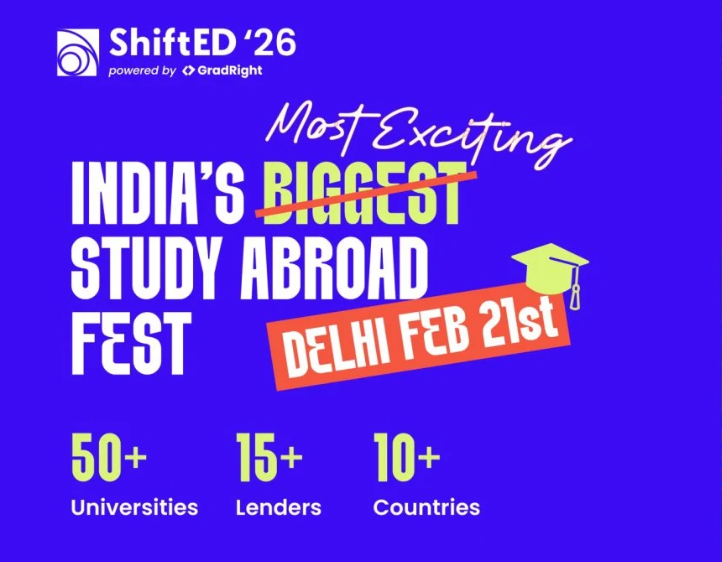If you’re choosing between the UK and France for your higher studies abroad, you’re not picking between the Eiffel Tower and Big Ben.
You’re picking between two very different systems.
One where everyone speaks your language (and charges you for it), the other where you might need to learn theirs, but spend half as much.
Both countries offer high-quality education. But the experience, cost, post-study benefits, and long-term returns are not the same.
And here’s what no glossy brochure will tell you: your decision has to be more than emotional.
Because a degree is what you get from it at the end. That means career outcomes, post-study work rights, and whether the investment you’re making will actually lead to a job that pays it back.
We’re going to break down the UK vs France question exactly the way students and families need to think, by looking at academics, cost of living, scholarships, visa hurdles, long-term employment, and ROI.
You’ll also find hard truths like how brand-name universities in the UK don’t guarantee visa sponsorships, or how France’s cheap tuition doesn’t mean no red tape. We’ll compare the systems side by side, cut through fluff, and get to the one question that matters:
Which of these two countries gives you more value as an international student in 2025?
Let’s begin.
Note: Choosing between the UK and France involves many factors beyond just landmarks and language. That’s why GradRight’s university search platform is so useful—it helps you cut through the clutter by matching you with universities based on your profile, budget, and career goals in both countries. With AI-powered insights on scholarships, ROI, and post-study work options, you get a clear picture to make an informed decision. This way, you can pick the destination that truly offers the best value for your study abroad journey.
Why choose the UK or France to study abroad?
You don’t shortlist countries like the UK or France by chance. You land on them when you start asking the right questions:
- What’s the ROI on my education?
- Where can I work after?
- How fast can I earn back what I spend?
That’s when these two names show up.
If you’re considering either, you’re weighing two very different bets on your future.
The UK is the safer, faster, and more expensive route. France is slower, cheaper, and in some cases, harder, but it stretches your money further.
Over the last few years, both systems have also moved in different directions.
The UK has tightened who can bring dependants and is already planning to shorten its post-study Graduate Route for future intakes.
France, especially for Indian graduates, has quietly gone the other way with longer job-search options. The 5-year alumni visas make it easier to stay connected with Europe.
So what makes these two countries stand out in a list of 30 others?
Let’s break it down.
The UK Gives You Pace and Predictability
Everything about the UK system is designed to move you from classroom to career as fast as possible:
- Most master’s degrees are one year. You’re done in 12 months, saving time and living costs.
- You don’t need to adjust to a new language or education format. Courses are in English. Teaching is discussion-heavy, but structured.
- Big-name universities like UCL, LSE, and Edinburgh are employer magnets. Career fairs, job boards, and alumni networks, they’re structured and aggressive about placements.
- And with the 2-year Graduate Route visa, you get a no-questions-asked window to stay and work after your degree. No sponsor needed upfront.
But the trade-off is that it’s expensive. So, how much does it cost to study abroad in the UK?
Tuition can hit £30,000, which is around ₹30 lakhs. Living costs in London will burn through another £15,000–£20,000 fast, which is another ₹15 lakhs.
And with the Graduate Route visa, you currently get a 2-year window (3 years if you’re doing a PhD). During this period, you can stay and work after your degree without needing upfront sponsorship.
From January 1, 2027, that window is due to shrink to 18 months for new bachelor’s and master’s graduates. So, your intake year and application timing matter.
Is it worth it?
Yes, if you’re clear about your career path, have a competitive profile, and aim for ROI from day one.
France Gives You More Time and Value
France, on the other hand, doesn’t try to sell prestige. It quietly delivers affordability and access if you’re willing to work the system.
- Public university tuition for non-EU students is officially set at about €2,895/year for bachelor’s (Licence) programs and €3,941/year for master’s in 2025–26 → roughly ₹2.6–₹3.7 lakhs.
- Private business schools charge more, often €10,000–€15,000 a year (and in some cases up to €20,000) → roughly ₹9–₹18 lakhs.
- And living costs for most other cities come in under €850/month, except expensive ones like Paris → ₹75,000/month or ₹9 lakhs/year
- Plus, you get housing aid (CAF), subsidised meals, public healthcare, and cheap transport, all baked into your student visa
So, how much does it cost to study abroad in France, and is it really cheaper than the UK?
It’s not like you can study abroad in France for free. But once you layer low public tuition with CAF support and €3 student meals, it often feels like the state is sharing a real part of your education bill.
Furthermore, France now offers over 1,600 full English-taught programs, especially at the master’s level. And you get a 12-month post-study work window to job hunt, start an internship, or transition into a work permit once hired.
The catch is that life in France runs in French. Even if your course is in English, the admin, rent agreements, part-time jobs, and job market all expect some French.
Still, if your goal is to limit debt, get a degree recognised across the EU, and access a broader job market later, France gives you real value at half the cost.
Having said that, let’s look at what the top universities in the UK and France actually offer and what they don’t.
Top universities in the UK vs. Top universities in France
Most students look at QS rankings and assume the higher the number, the better the job outcomes. But in reality, what matters isn’t where a university sits on the list; it’s where it gets you hired.
UK
If you’re studying in the UK, your university’s name does a lot of the heavy lifting.
The best UK universities are tied directly into hiring networks through industry-linked research, career fairs, alumni access, and built-in internship routes.
Let’s look at the ones that actually open doors:
- Imperial College London (#2): London’s deep-tech powerhouse. AI, biotech, quantum. The research culture overlaps with startups, and grads walk straight into R&D teams across the UK and EU.
- University of Oxford (#3): Old money, but very current. Strong pipelines into climate science, vaccine research, and global policy. You’re essentially getting funded access to billion-pound labs.
- University of Cambridge (#5): Especially strong in pure maths and biotech. Silicon Fen companies recruit directly from campus. Close integration between teaching and commercialisation
- UCL (#9): Known for cross-disciplinary programmes in architecture, policy, and neuroscience. Very global. Good for students who want flexibility and wide-ranging career options.
- University of Edinburgh (#27): Tech-heavy, especially in informatics and AI. A top choice if you want strong teaching in a city with rising data science demand.
If you’re paying UK-level fees, ₹30 to ₹45 lakhs total, your university has to carry recruiter weight. Otherwise, the ROI breaks fast.
France
France doesn’t compete on surface rankings. It competes through focused pipelines.
And if you understand how the academic system works, public universities, Grandes Écoles, and specialist schools, you can get outcomes that match (or beat) the UK, for a fraction of the cost.
Here’s how:
- Université PSL (#24): Pure research engine. Physics, philosophy, and theoretical sciences. Small cohorts. Serious depth. If your next step is a PhD or a research lab, this is the name they recognise.
- Institut Polytechnique de Paris (#46): Five Grandes Écoles stitched together. Built for deep-tech, like robotics, applied maths, cybersecurity. Recruits straight into Airbus, Thales, Renault.
- Sorbonne University (=#63): Known for marine science and astrophysics, but also strong in literature and classics. Good balance between old-school academics and research innovation.
- Université Paris-Saclay (#73): Heavily research-driven. Closely tied to French and EU labs like CERN, CNRS, and agritech hubs. Top choice for data and physics students.
- Sciences Po (top 350): If you want to work in diplomacy, policy, or international affairs, this is France’s launchpad. Reputation matters more here than rank. The name travels well inside the EU system.
Rankings note: Imperial College London, Oxford, Cambridge, Université PSL, and Paris-Saclay all sit in the global top tier (often somewhere in the top 30 of major rankings around 2025/26), but the exact number next to their name shifts slightly every year.
So if you’re choosing between the UK and France, your university choice is based on how each country structures value.
In the UK, you’re paying a premium. That only makes sense if the university brand actually drives career outcomes in your domain. If it doesn’t, you’re just spending more for less return.
In France, you’re navigating a layered system. But if you get it right, if you choose a school aligned to your sector, you could get the same outcomes for a third of the cost.
And cost is exactly where we go next.
Because it’s one thing to pick the right university, it’s another to afford everything around it. Let’s now look at what it really costs to live and study in the UK and France, and where your budget actually stretches further.
Cost of living for international students: UK vs. France
Tuition is only half the bill. What really stretches your budget is where you live, how you travel, what you eat, and how long you’re paying for all of it.
And this is where the UK and France offer two very different cost environments, one front-loaded, the other designed for endurance.
Living In The UK Is Predictable But Punishing
Most international students spend anywhere between ₹1.3 and ₹1.8 lakhs per month, especially in big cities like London, Edinburgh, or Manchester.
Here’s where that money goes:
- Accommodation: £600–£1,000/month → ₹63,000–₹1.05 lakh
- Utilities + Internet: £100/month → ₹10,500
- Groceries: £150–£200/month → ₹15,750–₹21,000
- Transport (city passes): £70–£100/month → ₹7,350–₹10,500
- Basic health insurance top-ups or GP charges: Variable
The UK Home Office itself assumes you’ll need at least £1,334 per month in London and £1,023 per month outside London when it checks your maintenance funds for a student visa.
Most Indian students end up somewhere close to that London number once rent, transport, and food are added up.
Part-time work at roughly £11–£12 an hour can cover some of this. But when your master’s is only 12 months long, you don’t get many pay cycles before graduation. So, you can’t rely on that income to rebuild your savings.
Let’s assume you’re sharing housing and keeping a modest lifestyle. If you’re in London, or living solo, your spending easily crosses ₹2 lakhs/month.
The real pinch is that you’re compressing these costs into a 12-month master’s. So even though you’re finishing faster, your monthly burn rate is high. You don’t get much financial breathing room, and part-time work rules (20 hours/week) help, but don’t solve the problem.
Living In France Has A Slower Pace But More Support
France is slower, but more forgiving. You’ll likely spend ₹80,000 to ₹1.2 lakhs per month, depending on the city. Paris is expensive, but Lyon, Toulouse, Nantes, and Grenoble, all major student cities, are far more affordable.
And the structure of support is different:
- Accommodation: €350–€650/month → ₹31,500–₹58,500
- Utilities + Internet: €80–€120 → ₹7,200–₹10,800
- Groceries: €200–€250 → ₹18,000–₹22,500
- Transport: €30–€60 → ₹2,700–₹5,400
- Student meal subsidies, public insurance, CAF housing aid: Included with student status
Official guidance for non-EU students assumes you’ll need around €820–€1,000 per month to study in France.
Once you’re enrolled, the French government gives students access to subsidised housing (CAF), cheap meals at CROUS dining halls, and free or minimal-cost public healthcare. These are built into the system.
Depending on the city, and with CAF housing aid plus part-time work at around the French minimum wage (SMIC, currently about €11.88/hour gross), most students who budget carefully manage on €800–€1,200 a month.
You need to account for these costs for 2 years (most French master’s are 2-year degrees). So while you’re staying longer, your financial load is stretched, not spiked.
So, where does your budget go further?
If you can afford to pay fast and leave fast, the UK gives you a tight, high-cost, high-speed path. If you need your savings to last, France gives you a longer, slower arc with more structural support.
And when your cost structure is clear, your next question is obvious:
Can you bring the upfront number down through scholarships, grants, or government support?
Let’s look at what kind of funding options are actually available in the UK and France, and who usually gets them.
Scholarships for international students in the UK and France
A ₹30–40 lakh education looks very different if you shave 20% off the top.
But not all scholarships are worth chasing, and not all are designed for international students. Let’s break down what funding is actually in play in the UK and France, and how much of a dent it makes in your total cost.
UK
Most UK universities advertise scholarships. But they’re often merit-based, limited in number, and locked behind early deadlines.
And here’s what many students don’t realise: unless you’re applying to a high-priority course (STEM, policy, sustainability), your odds aren’t great.
What you’ll typically find:
- Partial waivers (₹2–5 lakhs on average), not full rides
- Merit-based, with limited seats and strict deadlines
- Tied to departments or course priorities like data science, public policy, or sustainability
In other words, most of the real scholarships to study abroad in the UK for Indian students are small-to-medium fee cuts on specific courses rather than full-ride offers you can rely on.
You’ll also see global awards like:
- Chevening: Covers tuition + living + airfare, but reserved for students with leadership profiles and significant work experience. Not for fresh grads.
- GREAT Scholarships: Usually £10,000 → ₹10.5 lakhs. Available for select Indian students, but again, small numbers, limited courses.
- Commonwealth Scholarships: Full funding, but mostly for research and low-income Commonwealth countries.
These awards won’t erase your tuition, but they can bring a ₹35 lakh degree closer to ₹28–30 lakhs. That could trim 6–12 months off your loan recovery.
You should note that UK universities are under pressure to plug funding gaps after a dip in international enrolments.
So, don’t be surprised if scholarships are tightly tied to very specific “priority” courses, regions, or recruitment targets rather than being widely available across every programme.
France
France doesn’t hand out big merit scholarships like the UK does. But it does something else, it subsidises costs from the inside.
If you’re studying at a public university:
- Your tuition is already low: €3,770/year → ₹3.4 lakhs
- You’re eligible for CAF housing aid, which can cut rent by 20–35%
- You get access to subsidised meals: full plates at €3
- Public transport is heavily discounted for students
- Health insurance is included in your visa + registration
That’s not called “scholarship” in official terms, but it’s what lets students survive on ₹10–12 lakhs/year, including tuition.
There are also real, if limited, merit awards:
- Eiffel Excellence Scholarships: Run by the French Ministry for Europe and Foreign Affairs. Covers tuition + €1,181/month stipend + return airfare. Competitive, but open to Indian students.
- Campus France & Charpak Programmes: For students applying to select universities or research tracks. These are offered seasonally, and deadlines matter
- University-level fee waivers: Select Grandes Écoles (e.g., Sciences Po) offer partial waivers to international applicants with academic distinction.
When people talk about France’s study abroad scholarships, they usually mean this mix of Eiffel, Charpak, regional schemes, and institutional fee waivers layered on top of already subsidised tuition.
Campus France centralises most of them through its CampusBourses search tool, which you should treat like a second application portal if you’re serious about France.
If you’re applying smart, early, and in a priority field, you can bring a 2-year French degree under ₹12 lakhs, all in.
So now that you’ve mapped cost and funding, let’s compare the post-study work options in the UK and France.
Post-study work opportunities in the UK vs. France
Let’s look at how the UK and France handle post-study work, and what kind of flexibility you actually get once your student visa expires.
UK: You Get A Time-Limited Post-Study Stay, Then You Need Sponsorship
The UK’s Graduate Route visa currently lets international bachelor’s and master’s graduates stay on to work or job-hunt for up to 2 years (3 years if you’ve finished a PhD).
From 1 January 2027, the new Graduate Route visa validity for bachelor’s and master’s grads is scheduled to be cut to 18 months. So, if you’re starting now, you need to check which side of that line your intake and visa application will fall on.
During the Graduate Route period, there’s no employer sponsorship requirement and no minimum salary threshold. You can switch jobs, sectors, or even freelance, as long as you stay within general immigration rules.
The countdown starts from the date your university reports your course completion.
To stay beyond that window, you’ll usually need to switch into a Skilled Worker visa. It now requires a salary of at least around £41,700 per year or the official “going rate” for your role, whichever is higher.
So, there’s some breathing room to find a job after graduation. And if you land a Skilled Worker job during those two years, you can convert your visa and stay on.
But unless employers are willing to sponsor your Skilled Worker visa (and pay the associated fees), they often treat Graduate Route hires as short-term staff. That means you still have to fight for sponsorship if you want to stay long-term.
France: You Get 12 Months To Land A Job And Switch To A Work Permit
France gives non-EU graduates of master’s programs a temporary residence permit called the APS (Autorisation Provisoire de Séjour). It’s valid for 12 months and lets you:
- Stay in France legally
- Search for full-time work
- Work in any field as long as it matches your degree
- Convert to a long-term work visa once you’ve signed a full-time job contract
If you graduate from a recognised French institution (and especially if your course was in English), you qualify for this automatically. You don’t need a job offer to apply.
In practice, this job-search phase can be extended in many cases via a dedicated “job search or business creation” long-stay visa.
It effectively gives you up to 24 months in France to find a qualifying job offer or set up a business that supports a work permit application.
Some students get a 24-month APS, especially if they graduate from specific high-demand programs. But in most cases, it’s a one-year window.
The key difference from the UK is that once you land the job, France lets you convert that job into a proper residence and work visa without leaving the country.
For Indian graduates, France has gone a step further.
Within four years of finishing a French master’s, you can apply from India for a 1-year renewable long-stay visa dedicated to job search or business creation.
And there is also a separate 5-year multiple-entry short-stay “alumni visa” that lets you return to France and the wider Schengen area for projects, events, or short contracts without starting your visa journey from scratch each time.
So, either way, you need to move fast after graduation.
Next, let’s break down what English-taught programs actually look like in both countries and what that means for your classroom and your career.
Availability of English-taught programs in the UK and France
Let’s make this simple.
- In the UK, everything is in English.
- In France, almost everything outside the classroom isn’t.
UK
Every degree, every assignment, and every interaction with faculty is all in English by default. You don’t need to worry about translations or dual-language policies.
It means you can focus entirely on your coursework and job prep without having to work through a language curve. And when you graduate, every part of your job hunt also runs in English.
So if you’re not planning to learn a second language and want zero academic friction, the UK makes that easy.
France
France has made serious progress on English-taught degrees.
You’ll find over 1,600 full master’s programs offered entirely in English. Business, public policy, tech, design, international relations. Most top universities on your shortlist will also offer multiple English-first tracks.
But the moment you step outside the university bubble, the system switches.
So even though your education might be in English, your ability to live and work comfortably after graduation will improve dramatically if you can speak at least intermediate French.
Some students do just fine without it. But if you’re planning to stay after graduation, or apply for public-sector roles, research jobs, or anything involving client-facing work, you’ll be at a disadvantage without the language.
Next, let’s look at the student visa process in each country, and what kind of timeline, paperwork, and post-approval rules you’ll actually need to plan for.
Student visa process: UK vs. France
Both countries offer straightforward visa routes, but the experience of applying (and living on that visa) is very different.
The UK Is Fast, Checklist-Driven, and Expensive
Once you’ve received your Confirmation of Acceptance for Studies (CAS) from your university, you can apply for the UK Student visa.
- Application timeline: Open 6 months before your course start date
- Processing time: Usually 3 weeks
- Visa duration: Covers full course length + 1–4 months buffer
- Post-study rights: Automatically includes 2 years under the Graduate Route (3 for PhDs)
- Cost:
- Visa fee: £524 if you apply from outside the UK (2025 figure)
- Immigration Health Surcharge (IHS): Approximately £776/year → ~₹81,500/year
The Immigration Health Surcharge for students is charged for your full visa length (course plus a few extra months) and gives you access to the NHS. So, you don’t need separate private health insurance just to see a doctor.
So, there’s very little ambiguity. As long as your documents are in order, you’ll get the visa. It’s one of the least subjective processes among major study-abroad destinations.
A big change since 2024 is around family.
If you’re coming for a taught master’s, you normally can’t bring dependants to the UK anymore.
Only government-sponsored students and those on full-time research-based postgraduate courses of at least 9 months are allowed to bring family members, and each dependent has to pay the same visa fee and IHS on top.
France Has Slower Timelines, More Moving Parts
France uses the VLS-TS (long-stay student visa), which doubles as a temporary residence permit.
- Application timeline: Start 3–4 months before intake
- Processing time: Typically 4–6 weeks after the Campus France interview
- Visa duration: 12–24 months, depending on course
- Post-study rights: Not automatic, you must apply separately for a temporary stay permit (APS)
- Cost:
- Visa fee: Approximately €99 → ~₹9,000
- Health insurance: Covered through the public student system (no separate premium needed)
Campus France handles the pre-approval process, and you’ll need to go through an interview. It’s not difficult, but if you delay, you miss intake.
Once approved, the visa gives you access to public services like housing aid (CAF), transport discounts, and subsidised meals. But you’ll need to validate it again online once you arrive in France.
After that online validation, your VLS-TS doubles as your residence permit and gives you the right to work up to 964 hours per year alongside your studies. That’s about 60% of a full-time workload.
Conclusion
The UK and France don’t compete on the same terms. One sells speed. The other sells sustainability.
A master’s degree in the UK is built to move fast. If you know your career path, can afford the cost, and land in a top-tier university, the system clears space for you.
The question is whether that speed justifies the spend. Because if the university brand doesn’t convert, you’re paying Western prices for average outcomes.
France takes longer, but gives you more to work with. Lower tuition, subsidised housing, and a clear visa pathway once you’re employed. It doesn’t offer the same global brand recognition, but if you match your degree to the right sector, the long-term ROI is often better. Especially if you are staying and working in Europe.
So ask what you actually need from this degree and which system lets you build it, without bleeding time or money along the way.
FAQs
1. Which country is better for international students: the UK or France?
It depends on what you value. The UK is better if you want speed, brand-name degrees, and predictable systems but it’s expensive. France gives you more affordability, time, and public support, but it takes more effort to navigate.
2. What are the tuition fees and living costs like in the UK and France for international students?
In the UK, tuition ranges from ₹18 to ₹35 lakhs, and living costs add another ₹12 to ₹20 lakhs. In France, tuition at public universities is around ₹3 to ₹4 lakhs per year, and total living costs for two years come to about ₹10 to ₹15 lakhs with subsidies.
3. Are there post-study work opportunities in both the UK and France?
Yes. The UK gives you a 2-year Graduate Route visa (3 for PhDs) after graduation. In France, you get a 12-month APS permit to find work and convert to a long-term visa.
4. Which universities in the UK and France are best for international students?
In the UK, top options include Imperial, Oxford, Cambridge, UCL, and Edinburgh. In France, IP Paris, PSL, Sorbonne, Paris-Saclay, and Sciences Po lead in employer conversion and sector-specific outcomes.
5. Can I find English-taught programs in both the UK and France?
Yes. All UK programs are in English by default. France offers 1,600+ fully English-taught master’s programs, but outside the classroom, French is often needed for jobs, housing, and admin.

















